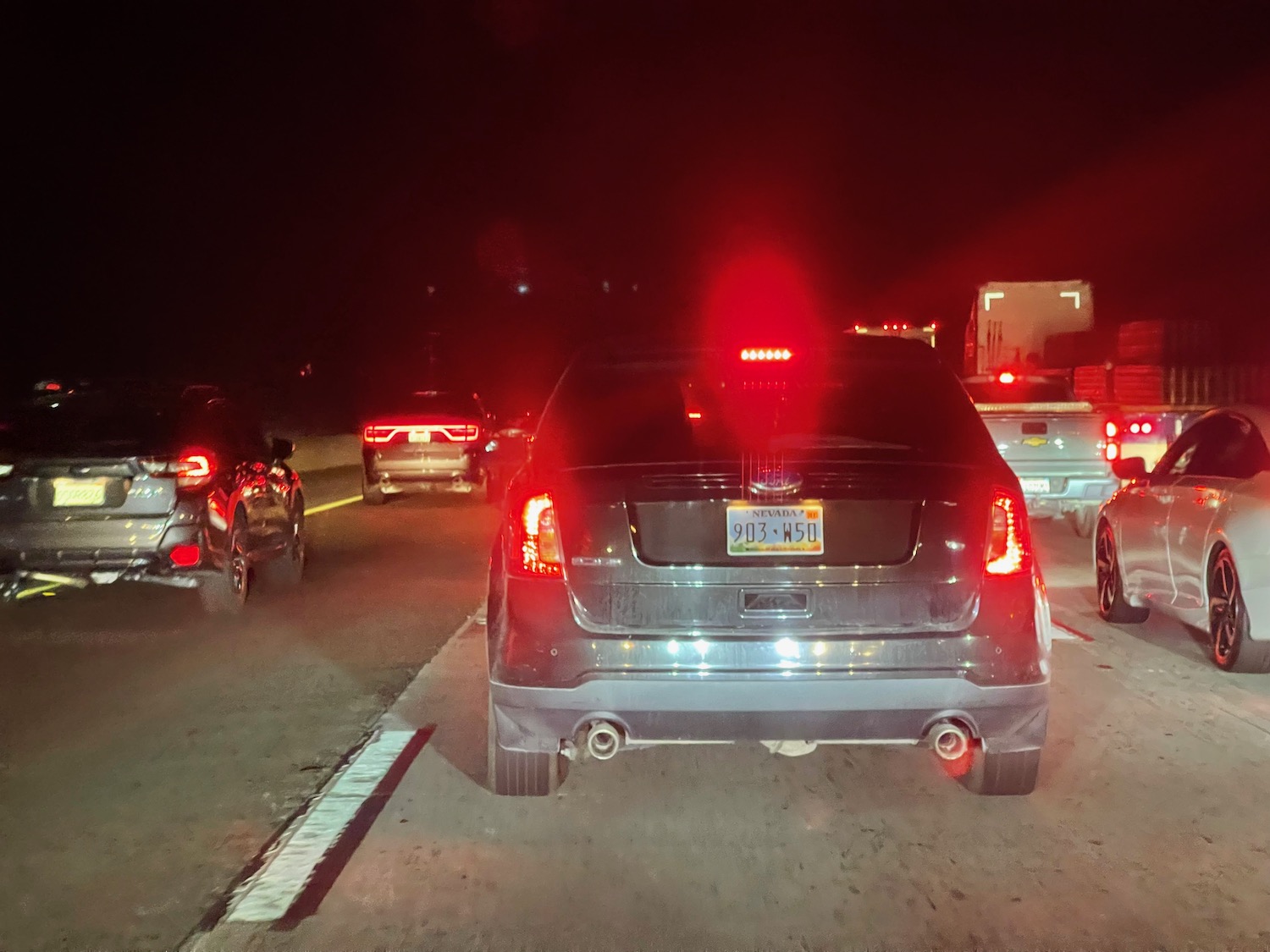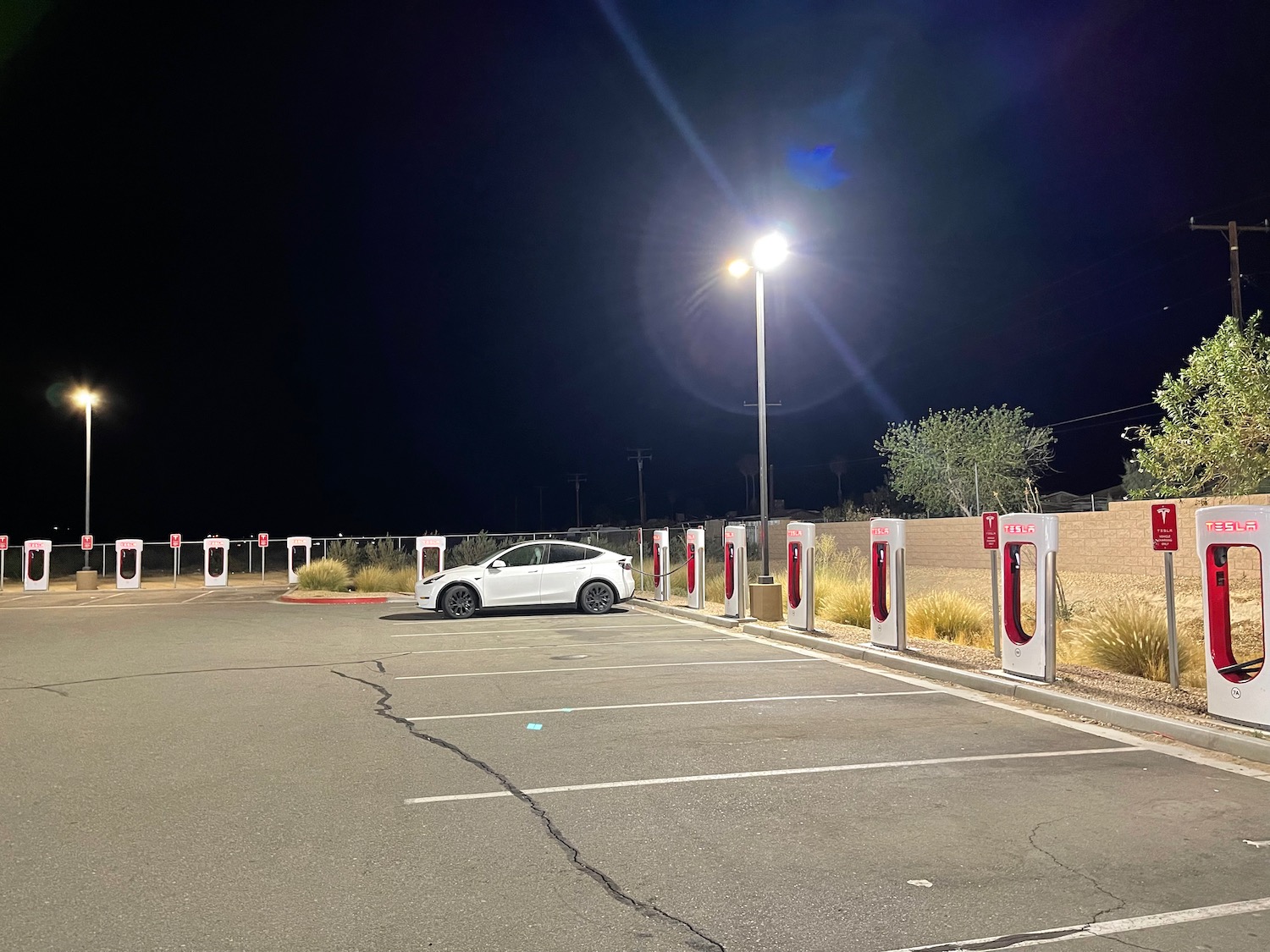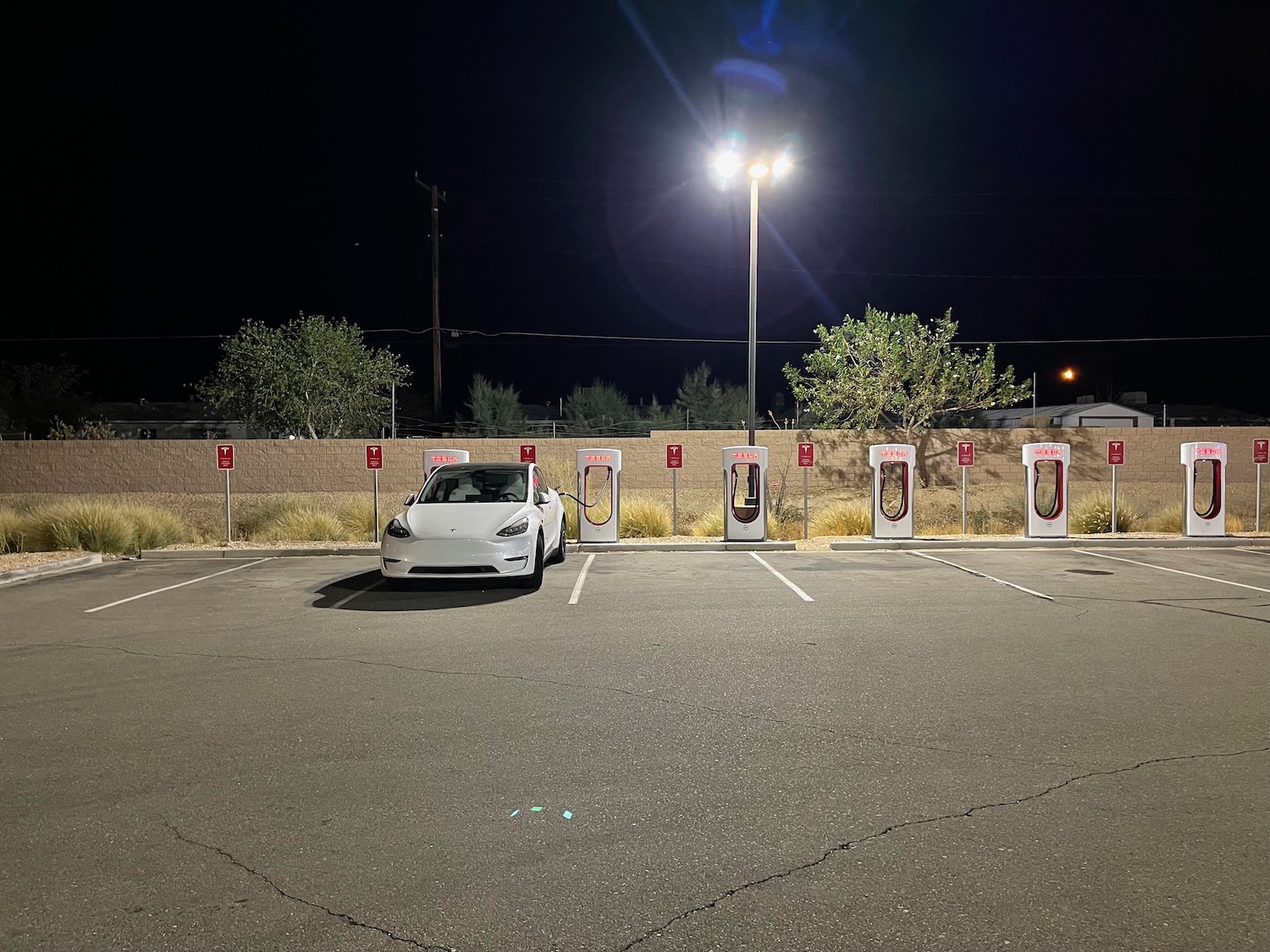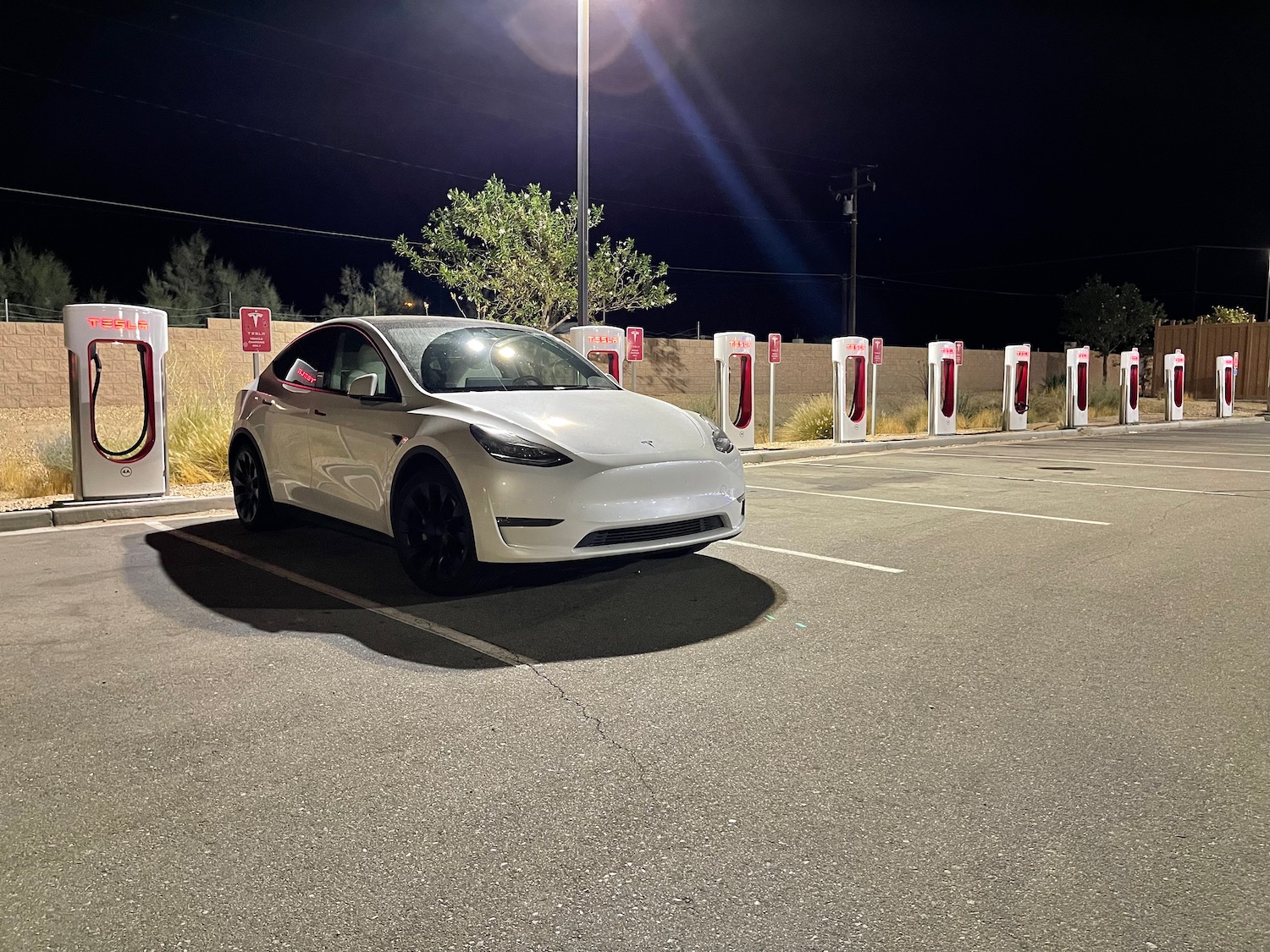I’m “live-blogging” my spontaneous road trip to Las Vegas.
I collapsed after stepping out of my car. What an odd occurrence…
We hit heavy traffic due to roadwork outside of Victorville and sat for a good 45-minutes. Because of the last-minute nature of the trip, my car was not fully charged (we left with about a 60% charge).

The Tesla navi automatically factors in charging stops and selected Yermo, California, an unincorporated community in the Mojave Desert in San Bernardino County 13 miles east of Barstow on Interstate 15.
So we pulled into the lot and I plugged in the car. I only needed about 15 minutes of charge to make to Las Vegas (nearly empty), but I decided to fill the car to 100% because I needed a nap. Augustine had fallen asleep many miles back.
I plugged in the car and fell asleep in the front seat.

About 45-minutes later I woke up, with the car almost fully charged. My legs were tingling, but I put pressure on them and they seemed okay.
I stepped outside of the car, took two steps just fine, and then promptly collapsed on the ground. My legs just totally gave out.
#scary
I’m no doctor, but I have to imagine the collapse was because my legs were “asleep” due their position or pressure while I slept in the driver’s seat. But why was I able to take two steps just fine? Why was I able to get up right away and walk normally like nothing happened?
So strange. The entire lot was empty, so if it was more serious there was no one around to help.



Thankfully, I’m okay and we are on our way again…
Have you ever collapsed like that?





Glad you’re ok and Occam’s Razor suggests that your legs fell asleep.
This is the reason why I’ll never buy an electric car. It’s not that charging your car is impossible, or even difficult, but simply that I don’t want to have to consider it and have another thing to have to think, plan for, and worry about. There are gas stations everywhere and I can find one anywhere, and whenever I need one, no thinking required.
I have this issue with LPG, there are very few places to fill up in England so each long journey needs to be carefully planned. However, it’s nearly tax free and that’s why I stick with it (not just because of the savings, but also because the govt gets less money).
Except that:
1/ The vast majority of car trips – long or short – are the same as ones that have been done before (many of them dozens if not hundreds of times) and, once you get to know what the best place(s) is/are to stop and charge (assuming you even need to in the first place), then all the drama evaporates – as long as you are driving a Tesla, of course!
2/ (In case you have been living in a cave or something for the last 10 years…) BURNING OIL IS EXTRAORDINARILY STUPID! It is a finite resource the use of which is destroying our environment. If you have a perfectly acceptable (and hugely more efficient, cheaper and nicer) alternative – WHY in GOD’s NAME would you not take it?!!!
I stayed at a Holiday Inn Express so I present several possibilities.
1. legs fell asleep. They should be numb if the is the case.
2. orthostatic hypotension, suddenly standing up. Legs would not be numb but the brain might be woo
3. seizure
4. spinal cord tumor, probably with pain. You would be awake and alert the entire time that you fell.
5. heart arrythmia. Some football players suddenly die of this.
6. cholesterol blockage of neck arteries
Dr. Google also has this….
Patients who present with presyncope should be evaluated similarly to those who present with syncope. C 20, 21
Patients with syncope and evidence of congestive heart failure or structural heart disease, abnormal electrocardiographic findings, or a family history of sudden death should be admitted to the hospital for emergent evaluation. C 1, 25, 27, 29
Patients presenting with syncope should have orthostatic blood pressure measurements and standard 12-lead electrocardiography. C 1, 2, 25, 27, 29
Laboratory and imaging studies should be ordered for patients with syncope only if clinically indicated by the history and physical examination. C 1, 27, 39, 40, 42, 43, 50, 51
Implantable loop recorders increase diagnostic yield, reduce time to diagnosis, and are cost-effective for suspected cardiac syncope and unexplained syncope. C 1, 39, 44–48
Patients with syncope who are at low risk of adverse events (e.g., those with symptoms consistent with vasovagal or orthostatic hypotension syncope, no history of heart disease, no family history of sudden cardiac death, and normal electrocardiographic findings) may be safely followed without further intervention or treatment.
source: https://www.aafp.org/pubs/afp/issues/2017/0301/p303.html
My Holiday Inn Express School of Medicine training points to the last paragraph. You were able to walk 2 steps fine and also walk away fine. That may point to something other than the legs falling asleep. So see if you have a normal EKG. If you do and don’t have the rest of what is described in the last paragraph, then this is good, according to that paragraph.
I can’t tell you why exactly this happens to people, but it does. It happened to me once after sitting funny for a while. The first time I heard of this, a friend of mine told me that as a young lady she went to a movie with a young man that she was interested in. He put his hand on her thigh while her legs were crossed. She didn’t want to move his hand because she thought it would seem off-putting, so she sat with her legs crossed for the remainder of the movie. At the end, she stood up, took a step or two and then fell down, but was fine.
Of the things listed above- seizures and carotid disease, seem very unlikely just prima facie. A spinal tumor will generally give recurrent or persistent problems– certainly if this is recurrent it should be evaluated further. Heart problems are seemingly unlikely as well, but obviously none of us have a complete medical history here. The more recent generations of Apple Watches have a cardiac monitoring mechanism built in which can actually be useful in situations like this.
And I was wearing an Apple Watch which did not indicate any problem.
What does Apple watch monitor? Just pulse. I doubt it has full EKG readings. Furthermore, I heard that machine interpretation of EkGs are not very good.
I know someone(M.A.S) that died of a heart murmur around age 30. Thought it was minor but it was not.
I would see a doctor and at least get an EKG
Found the answer. Apple Watch does not do an EKG. It monitors heart rate and says it can detect some atrial fibrillation. It doesn’t claim to detect anything else.
https://support.apple.com/guide/watch/track-important-health-information-apple-apdc2bf82d90/watchos
I’m sorry to hear of your friend passing from a heart murmur. Obviously a murmur and an arrhythmia are different things.
Using an Apple Watch to detect cardiac problem is undoubtedly imperfect. But, so is attempting to diagnose a medical problem with a very limited history and no physical exam, over a message board. Similarly, quoting an old AAFP review article on syncope, when it’s questionable that this was a syncopal event, is imperfect.
As you likely know, to get to the point of physical collapse from arrhythmia there is generally going to have to be a problem with cardiac output during the event. It’s not necessarily impossible to have a normal and stable heart rate and experience a sudden drop in output due to arrhythmia but it’s a less common scenario– those who have drop attacks from arrhythmia often have an abnormal rate accompanying the attack.
The Apple Watch is likely the only objective source of physical examination that is available for the symptomatic event that occurred. Understanding its limitations is valuable, but it is at least data from the event. A normal 12 lead EKG done while asymptomatic has significant limitations too.
I attended the Holiday Inn Express School of Medicine. I am not a board certified cardiologist. Often internet replies will jump at one diagnosis. That is foolhardy. Look at actor and comedian John Ritter, who died 20 years ago next month. His wife sued because Ritter died of something else rather than a heart attack. If I were Matthew, I would see a doctor and ask if an EKG should be done, at the very least. The answer may not be found for something that happened in the past but it may help.
video about “but I stayed at a Holiday Inn Express”. https://www.youtube.com/watch?v=eHCTaUFXpP8
I don’t think he is sick enough or old enough to go through all that testing.
Vehicles that rely solely on battery power are not for road trips! Maybe someday, but not yet.
Agreed. But my wife needed the other car!
I am not a doctor, and those responding here are not either. I suggest you see a doctor.
+1
Clearly this is all Elon Musk’s fault.
Joking apart, I’m glad you’re OK, Matthew.
All good Matthew. Cram yourself in a whitewater kayak for a few hours on a river and you will understand it. Add in dehydration and it happens all the time. I call it the kayaker stumble.
Orthostatic Hypotension… when you get up after sitting or lying down for awhile.. Blood cannot re-circulate and back to your head from lower extremities fast enough… Two steps and down you go!!!
I described your episode to a friend who had the exact thing happen to her, 45 years ago! She woke up out of a deep sleep and took two steps, then collapsed. She thinks the first two steps were reflex but she hadn’t fully awaken, and then collapsed.
IT IS Elon’s fault. If you didn’t have to charge the car (1st error), you wouldn’t have fallen asleep (2nd error) and you wouldn’t have to get up (3rd error) and feel weak and fall; the “Swiss Cheese Model” of errors happening after another.
The same thing happened to me earlier this year. Got out of bed, stood up, took 1 step, then fell down on floor. Did not lose consciousness. It sounds like you did not pass out so either so it’s probably harmless.